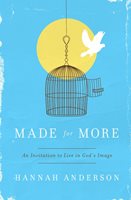Reviewed by Aimee Byrd
As much as I love to read Dorothy Sayers, her book Are Women Human? was a bit of a disappointment to me. I was left frustrated because the two essays contained in it housed some very good “Sayersesque” points, yet they were lacking something significant. Even as great as the title was, and as much as some of the arguments even made me want to stand up and clap, there was a theological element to the book that I didn’t have fulfilled. Of course, the subtitle reveals that the focus is more on the role of women in society, so Sayers gets a pass and I still love her works. Plus, she smoked a pipe with those Inkling fellows, which just makes her a total rock star in my book.
But I am very happy to say that Hannah Anderson has provided a theologically rich and easy to read book that could have the very same title: Are Women Human? And Anderson goes into detail about what it actually means to be human, made in the image of God. This is a very timely book because it seems that in an effort to combat liberal theology and feminism, the conservative church may have narrowed their focus a bit on the whole woman issue. As thankful as I am for some very helpful teaching on biblical womanhood, I am afraid that we may have become a bit reductionistic and one-dimensional. Now we tend to read Scripture and look at society through this lens of biblical womanhood. And what has happened is that the subject matter has become about men and women, rather than God.
That’s why Anderson’s book is a breath of fresh air. She doesn’t begin with the easy and obvious woman issue, but rather the very heavy issue that we are made in the image of God. Before we even question our identity as women, we need to question our identity as image bearers. And so Anderson affirms our sameness with men in humanity, as well as the implications of our differences. She explains how God reveals two important truths with his creation of Adam and Eve:
(1) both men and women are fully formed, equal image bearers, and (2) we are different from each other and therefore dependent on each other. In other words, while each of us is fully in the image of God, none of us can fully reflect and represent God alone. Instead we reveal the nature of God together; and as a result, we also find identity together. (37)
The whole book is organized to teach that “everything about life – from our gifting to our gender and to our personality – flows ‘from Him and through Him and to Him,’ that our very existence is linked deeply and inextricably to His” (12). And while Anderson starts with creation, moves to the fall, and the good news of the gospel, she does not cherry pick all the “pink” verses in the Bible to teach about being a woman made in the image of God. “When we identify first and foremost as women, we can begin to believe that knowledge of ourselves will come primarily through passages that speak to women’s issues or include heroines like Ruth or Esther. But when we do this, when we craft our learning and discipleship programs around being ‘women,’ we make womanhood the central focus of our pursuit of knowledge instead of Christ” (105). This is the part where I mimicked the scene from The Neverending Story, when Bastian quickly shut his book and looked up to the heavens. They were words that I would have proudly written myself. (And if you aren’t familiar with my movie reference, I don’t like you very much because it was before your time.)
There are all different sorts of writers. Some are humorous, some just have a great way of connecting a message to the general audience, and others reveal a superior intellectual prowess. Hannah Anderson is just good at writing. She weaves memories into sentences that make the reader feel as if they also had the same experience. She’s good with words, which makes her a joy to read.
My favorite part of the book was the last section, “And To Him.” The focus on our future hope moved me doxologically. She had a great section on our struggle with time and our hope of eternal glory. Anderson reminds us of Solomon’s line that God “’has put eternity in [our] hearts.’ And the beauty of this is that the cycles of life actually propel us toward Him because in the midst of constant change, our souls long for the Unchangeable. We long for Him” (167).
This book answers the “Who am I?” question, but it doesn’t stop there. Made For More points to what we are becoming, and therefore encourages us to worship our Creator and Redeemer with our whole life.
Aimee Byrd is a wife and mother of three and the author of Housewife Theologian. She is also the “Residing Housewife Theologian” here at Books At a Glance, reviewing books of interest to women.
Buy the books

Made For More: An Invitation To Live In God's Image